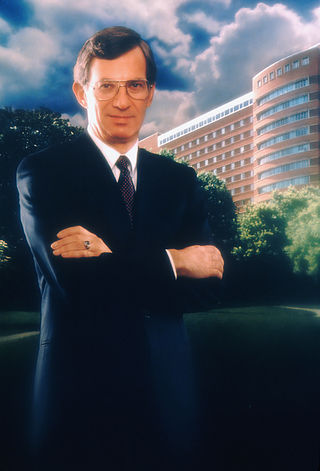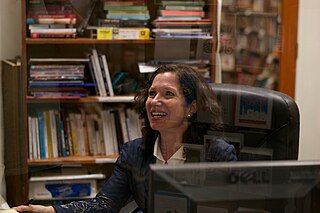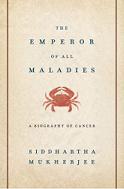Content
The book weaves together Mukherjee's experiences as a hematology/oncology fellow at Massachusetts General Hospital as well as the history of cancer treatment and research. [2] [3] Mukherjee gives the history of cancer from its first identification 4,600 years ago by the Egyptian physician Imhotep. The Greeks had no understanding of cells, but they were familiar with hydraulics. Hippocrates thus considered illness to be an imbalance of four cardinal fluids: blood, black bile, yellow bile, phlegm. Galen applied this idea to cancer, believing it to be an imbalance of black bile. In 440 BC, the Greek historian Herodotus recorded the first breast tumor excision of Atossa, the queen of Persia and the daughter of Cyrus, by a Greek slave named Democedes. The procedure was believed to have been successful temporarily. Galen's theory was later challenged by the work of Andreas Vaselius and Matthew Baille, whose dissections of human bodies failed to reveal black bile.
In the 19th century, surgeons devised various approaches to remove tumors, like William Halsted and the radical mastectomy. Additionally, Emil Grubbe used X-rays to treat cancer, thus identifying another treatment modality. Rudolph Virchow first observed leukemia, and Franz Ernst Christian Neumann localized the pathology to the bone marrow.
In the 20th century, cancer became the second most common cause of death after heart disease in the United States. Sidney Farber induced temporary remission in pediatric leukemia using antifolates developed by Yellapragada Subbarow. Louis Goodman and Alfred Gilman also used nitrogen mustard to treat lymphoma. The National Cancer Institute (NCI) introduced clinical trials to test the efficacy of chemotherapy. Recognizing the possibility for a cure, Farber sought funding for his efforts through The Jimmy Fund and Mary Lasker. Inspired by the Space Race, Farber and Lasker appealed to the nation and President Nixon to enact legislation for the War on Cancer, resulting in the passage of the National Cancer Act of 1971 and increased funding for the NCI.
The book also reviews the origins of hospice and palliative medicine and cancer screening.
According to Mukherjee, the book was a response to the demand of a patient: "I'm willing to go on fighting, but I need to know what it is that I'm battling." [4] Mukherjee states that two of his influences for the book were Randy Shilts' And the Band Played On and Richard Rhodes' The Making of the Atomic Bomb , but the defining moment for him was "when he conceived of his book as a biography". [4]
Reception
The Emperor of All Maladies won the 2011 Pulitzer Prize for General Non-Fiction: the jury called it "an elegant inquiry, at once clinical and personal". [5] [6] [2] The Guardian wrote that "Mukherjee manages to convey not only a forensically precise picture of what he sees, but a shiver too, of what he feels." [7] Literary Review commended Mukherjee's narrative: "It is so well written, and the science is so clearly explained, that it reads almost like a detective story—which, of course, it is." [8]
It was described, by the magazine TIME, as one of the 100 most influential books of the last 100 years, [9] and by The New York Times Magazine as among the 100 best works of non-fiction. [10]

Imhotep was an Egyptian chancellor to the Pharaoh Djoser, possible architect of Djoser's step pyramid, and high priest of the sun god Ra at Heliopolis. Very little is known of Imhotep as a historical figure, but in the 3,000 years following his death, he was gradually glorified and deified.

John Tracy Kidder is an American writer of nonfiction books. He received the Pulitzer Prize for his The Soul of a New Machine (1981), about the creation of a new computer at Data General Corporation. He has received praise and awards for other works, including his biography of Paul Farmer, a physician and anthropologist, titled Mountains Beyond Mountains (2003).

Atossa was an Achaemenid empress. She was the daughter of Cyrus the Great, and the wife of Darius the Great.

Vincent Theodore DeVita Jr. is the Amy and Joseph Perella Professor of Medicine at Yale Cancer Center, and a Professor of Epidemiology and Public Health. He directed the Yale Cancer Center from 1993 to 2003. He has been president of the board of directors of the American Cancer Society (2012-2013). He is internationally recognized as a pioneer in the field of oncology for his work on combination-chemotherapy treatments.

Ronald Chernow is an American writer, journalist, and biographer. He has written bestselling historical non-fiction biographies.
St. Columba's School in Delhi, India, was established in 1941 by the Indian Province of the Irish Christian Brothers, which was founded by Edmund Ignatius Rice. It is named after an Irish saint. The school's campus is located in the heart of Delhi and extends over 7 acres.

Mary Woodard Lasker was an American health activist and philanthropist. She worked to raise funds for medical research and founded the Lasker Foundation.
Robert Allan Weinberg is a biologist, Daniel K. Ludwig Professor for Cancer Research at Massachusetts Institute of Technology (MIT), director of the Ludwig Center of the MIT, and American Cancer Society Research Professor. His research is in the area of oncogenes and the genetic basis of human cancer.

Emil "Tom" Frei III was an American physician and oncologist. He was the former director and former physician-in-chief of the Dana–Farber Cancer Institute in Boston, Massachusetts. He was also the Richard and Susan Smith Distinguished Professor of Medicine at Harvard Medical School.
Variety, the Children's Charity is a charitable organization founded in Pittsburgh, Pennsylvania in 1927.
Joseph Holland Burchenal was an American oncologist, and a winner of the 1972 Albert Lasker Award for Medical Research for his work on developing a chemotherapy for Burkitt's lymphoma. His research with George Hitchings and Gertrude Elion led to the creation of the leukemia treatment mercaptopurine. He worked at Memorial Sloan Kettering Cancer Center and was a member of the presidential panel that initiated the U.S. federal government's War on Cancer. Burchenal died in Hanover, New Hampshire on March 8, 2006. He was 93 years old.

Benno Charles Schmidt Sr. was an American lawyer and venture capitalist who was active in New York City civic affairs and played an important role in the initiation of the War on Cancer.

Isabel Wilkerson is an American journalist and the author of The Warmth of Other Suns: The Epic Story of America's Great Migration (2010) and Caste: The Origins of Our Discontents (2020). She is the first woman of African-American heritage to win the Pulitzer Prize in journalism.

Timothy P. Egan is an American author, journalist and former op-ed columnist for The New York Times.

Siddhartha Mukherjee is an Indian-American physician, biologist, and author. He is best known for his 2010 book, The Emperor of All Maladies: A Biography of Cancer, that won notable literary prizes including the 2011 Pulitzer Prize for General Non-Fiction, and Guardian First Book Award, among others. The book was listed in the "All-Time 100 Nonfiction Books" by Time magazine in 2011. His 2016 book The Gene: An Intimate History made it to #1 on The New York Times Best Seller list, and was among The New York Times 100 best books of 2016, and a finalist for the Wellcome Trust Prize and the Royal Society Prize for Science Books.

The 2011 Pulitzer Prizes were announced on Monday, April 18, 2011. The Los Angeles Times won two prizes, including the highest honor for Public Service. The New York Times also won two awards. No prize was handed out in the Breaking News category. The Wall Street Journal won an award for the first time since 2007. Jennifer Egan's A Visit From the Goon Squad picked up the Fiction prize after already winning the 2010 National Book Critics Circle Award. Photographer Carol Guzy of The Washington Post became the first journalist to win four Pulitzer Prizes.
Émil Herman Grubbé was possibly the first American to use x-rays as a treatment for cancer but this is disputed and no reliable contemporary source of this claim exists. He was born in Chicago, and received his medical training at a homeopathic institute: the Hahnemann Medical College of Chicago. It was there that Grubbe assembled the first x-ray machine in Chicago in 1896, and that same year, used it to treat a woman with recurrent carcinoma of the breast (disputed). He assembled the machine and began to use it in treatments less than a year after Wilhelm Röntgen announced his discovery of the x-ray. By 1960, Grubbe had instructed over 7000 other doctors in the medical use of x-rays. In the course of his lifetime, he underwent more than 90 operations for multiple cancers caused by his intense, ongoing exposure to radiation, a disease from which he died. Honors were bestowed upon Grubbe by numerous institutions, including the American Cancer Society. He was also a fellow of the American College of Physicians. Grubbe left money in his will to the Chicago Radiological Society to fund the Grubbe Memorial Award.

Amy Waldman is an American author and journalist. She was a reporter with The New York Times for a total of eight years. For three years she was co-chief of the South Asia bureau. Before that she covered Harlem, Brooklyn, the Bronx, and the aftermath of 9/11.

Min Chiu Li was a Chinese-American oncologist and cancer researcher. Li was the first scientist to use chemotherapy to cure widely metastatic, malignant cancer.

Cancer: The Emperor of All Maladies is a 2015 American documentary film produced and directed by Barak Goodman and executive produced by Ken Burns. The film, in three episodes of two hours each, is based on the Pulitzer Prize–winning 2010 book The Emperor of All Maladies: A Biography of Cancer, by Siddhartha Mukherjee, and describes the history of cancer and cancer treatments, particularly in the United States.















